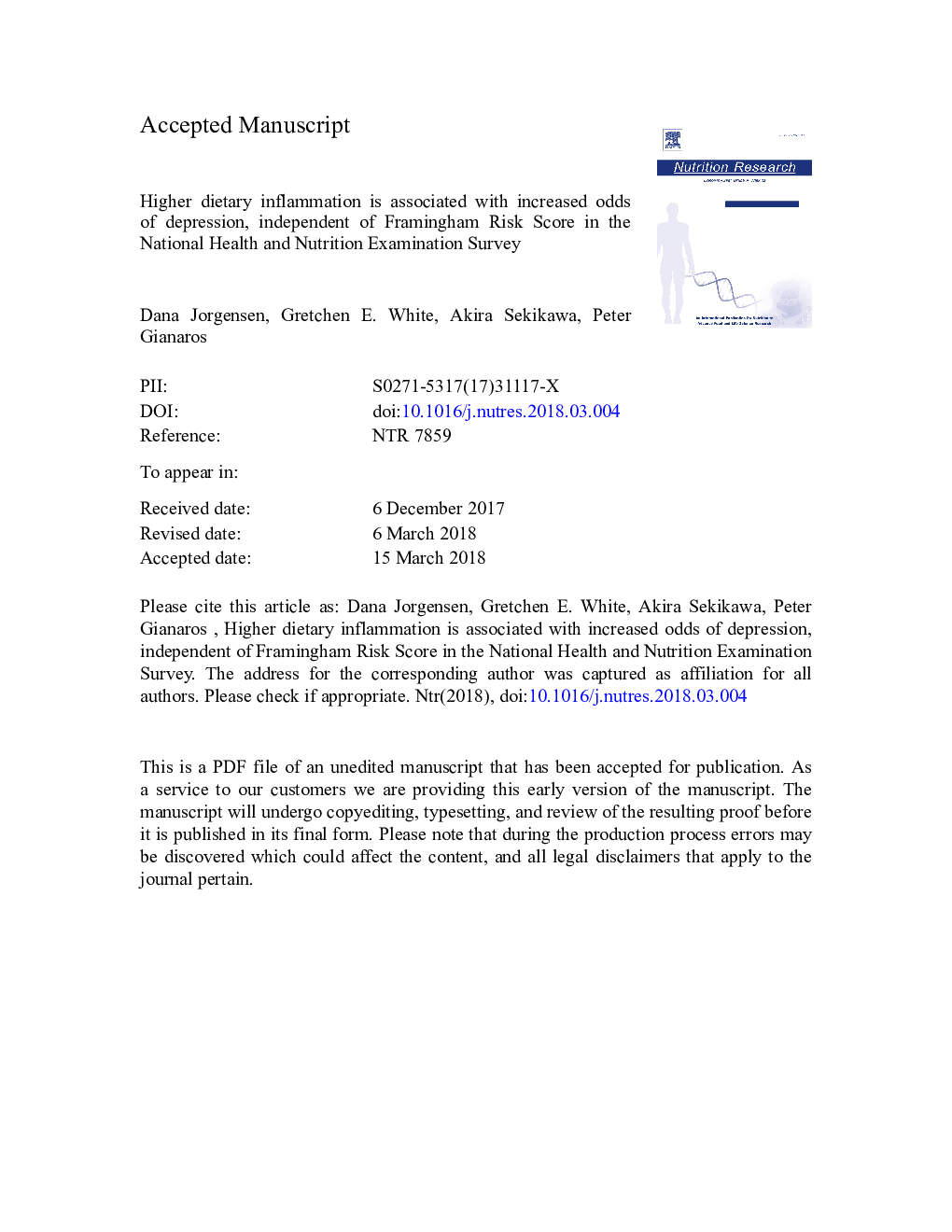| کد مقاله | کد نشریه | سال انتشار | مقاله انگلیسی | نسخه تمام متن |
|---|---|---|---|---|
| 8634131 | 1569091 | 2018 | 34 صفحه PDF | دانلود رایگان |
عنوان انگلیسی مقاله ISI
Higher dietary inflammation is associated with increased odds of depression independent of Framingham Risk Score in the National Health and Nutrition Examination Survey
ترجمه فارسی عنوان
التهاب بیشتر در رژیم غذایی با افزایش شانس افسردگی مستقل از نمره ریسک فرامینگهام در بررسی ملی بهداشت و تغذیه
دانلود مقاله + سفارش ترجمه
دانلود مقاله ISI انگلیسی
رایگان برای ایرانیان
کلمات کلیدی
PHQ-9FRSHDLNHANESDiI - DIIhigh-density lipoprotein - HDL یا لیپوپروتئین با دانسیته بالا یا چگالی بالاDepression - افسردگیSystemic inflammation - التهاب سیستمیکNational Health and Nutrition Examination Survey - بررسی بهداشت و تغذیه ملیcardiovascular disease - بیماری قلب و عروقیCardiovascular disease risk - خطر بیماری قلبی عروقیCVD - رسوب دهی شیمیایی بخار Dietary inflammatory index - شاخص التهاب رژیم غذاییFramingham risk score - نمره خطر فرامینگهامPatient Health Questionnaire - پرسشنامه سلامت بیمارC-reactive protein - پروتئین واکنشی سیCRP - پروتئین واکنشی سی یا سی. آر. پی
موضوعات مرتبط
علوم زیستی و بیوفناوری
بیوشیمی، ژنتیک و زیست شناسی مولکولی
علوم غدد
چکیده انگلیسی
Cardiovascular disease (CVD) may increase depression risk. Risk for future CVD, which can be estimated by the Framingham Risk Score (FRS), and depression risk are both linked to systemic inflammation. Dietary consumption of proinflammatory food can be measured using the Dietary Inflammatory Index (DII) score. We examined the potential impact of DII on depression and whether this effect is independent of FRS. We hypothesized that (1) both FRS and DII would be associated with depression (Patient Health Questionnaire-9â¯â¥â¯10) and (2) associations between DII and depressive symptoms (continuous) would be mediated by FRS. Data were included from adults without CVD who were participants of the 2007-2012 National Health and Nutrition Examination Survey (nâ¯=â¯11â¯624). Using logistic regression, we tested cross-sectional associations of FRS, DII (adjusting for FRS), and joint effects of FRS and DII with depression. Finally, using the Sobel method, we tested whether FRS mediates the relationship between DII and depressive symptoms. Individuals with FRS or DII scores in the top 2 quartiles had higher odds of depressive symptoms than those in the bottom quartile. The association of DII with depressive symptoms remained after FRS adjustment. The joint effects of elevated DII and FRS were additive. There was no evidence for mediation by FRS between DII and depressive symptoms. Thus, higher DII remained associated with increased odds of depressive symptoms net CVD risk. Collectively, the joint effects of CVD risk and DII indicate that a proinflammatory diet could add to risk for depressive symptoms even in those with a high FRS.
ناشر
Database: Elsevier - ScienceDirect (ساینس دایرکت)
Journal: Nutrition Research - Volume 54, June 2018, Pages 23-32
Journal: Nutrition Research - Volume 54, June 2018, Pages 23-32
نویسندگان
Dana Jorgensen, Gretchen E. White, Akira Sekikawa, Peter Gianaros,
